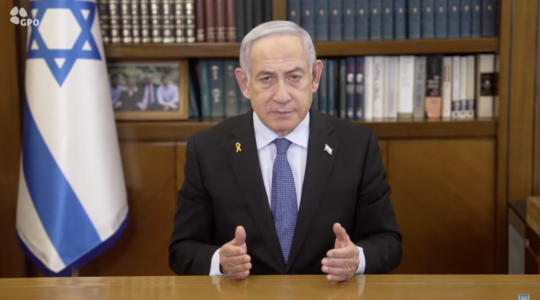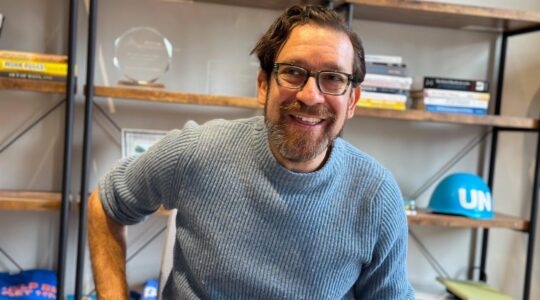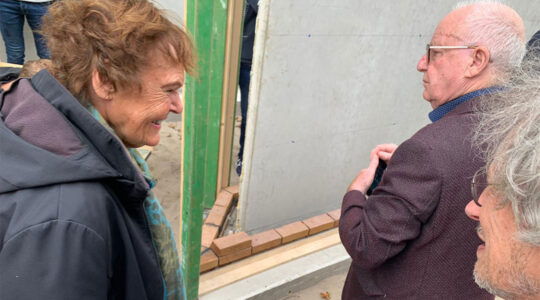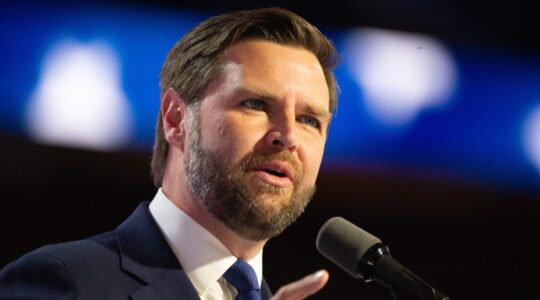BERLIN — The upcoming German election — in which the country’s far-right party is projected to come in second — was already going to be an anxious one for the country’s Jews.
Then, in a speech in Munich last week, 10 days before Sunday’s vote, Vice President J.D. Vance attacked the so-called “firewall” Germany’s mainstream parties have maintained against the country’s far-right party, Alternative for Germany, known as AfD.
AfD’s rise has alarmed German Jewish leaders and German politicians alike. Now, several are speaking out over what many saw as an attempt to undermine the longstanding boycott of the far-right, with some criticizing Vance directly.
Vance “deliberately forgets that the normative idea of the [German] constitution protects the principles of democracy by prohibiting discrimination,” said Jewish author Anetta Kahane, who grew up in former East Germany and founded the anti-racism, pro-democracy Amadeu Antonio Foundation in 1998. “This is what we have developed and painstakingly built up here over the centuries. And we will not allow that to be contested.”
AfD, a far-right party formed in 2013, has shot up to second place in the leadup to the vote, topping 20% in some polls. The party is fiercely opposed to immigration, particularly from Muslim-majority countries, and is also a critic of the European Union. It is polling ahead of the ruling center-left Social Democratic Party, which has slipped to third place, as well as other factions including the Greens and the Free Democratic Party.
“The AfD has a political program that thrives on exclusion and division,” said Karin Prien, deputy chair of the center-right Christian Democratic Union, which is leading the polls. Prien is Jewish and serves as the spokesperson for the party’s Jewish forum.
In an email to the JTA, she added that a lesson Germany must take from “our ancestors’ crimes against humanity is that it never begins with mass murder. It begins with the devaluation of human life, with fear-mongering, and with constant attacks on the fabric that holds our society together. And when democratic parties stand by in apathy, they enable future crimes.”
Germany’s main traditional parties, from left to right, have kept up their policy of boycotting the far-right by not including it in coalition governments. Vance’s speech on Feb. 14 did not mention AfD explicitly but was widely seen as a call for the party to be accepted into the German political mainstream.
“What German democracy — what no democracy, American, German or European — will survive is telling millions of voters that their thoughts and concerns, their aspirations, their pleas for relief, are invalid or unworthy of even being considered,” Vance said. “Democracy rests on the sacred principle that the voice of the people matters. There’s no room for firewalls.”
On his trip, Vance also met with Alice Weidel, AfD’s candidate for chancellor, who thanked him on X, the social network owned by top Trump administration adviser Elon Musk. Musk has repeatedly praised AfD and recently interviewed Weidel on X, where she falsely said Adolf Hitler was a communist, and was not right-wing.
Later, Vance tweeted that elite institutions work “to silence their own people and to delegitimize the beliefs of the public.”
He continued, “Even if you disagree with me substantively, these institutions have revealed themselves to be so brittle. AfD is in second place in Germany. The ‘far right’ keeps getting closer in France. Wake up!”
German Chancellor Olaf Scholz condemned Vance’s speech, alluding to the vice president’s visit to Dachau, the Nazi concentration camp, earlier in the week, and to the post-Holocaust expression “Never again.”
“A commitment to ‘never again’ is not reconcilable with support for the AfD,” Scholz said the day after Vance’s speech.
A series of statements from AfD politicians over the years downplaying the Holocaust or opposing the country’s culture of Holocaust remembrance have long drawn attention and concern. In 2018, one leading AfD politician famously called the Nazi era a “speck of birds–t” in German history. The party also opposes religious circumcision of boys, as well as ritual slaughter, which would preclude kosher and halal meat production.
Charlotte Knobloch, a Holocaust survivor and president of the Jewish community of Munich and Upper Bavaria, said AfD “has already successfully pushed the boundaries of what can be said.” She did not address Vance directly but worried about growing acceptance of the far-right.
“We are very concerned that there is already a trend towards normalization,” she said in an email interview. “Our democracy was built – with the help of the US liberators – from the ruins of the crime against humanity of the Holocaust and has returned to the circle of civilized states with the promise of ‘Never again!’”
She added, “There can be no normalization and certainly no cooperation with a party that describes this descent into singular inhumanity as “birds–t.”
Josef Schuster, who chairs the Central Council of Jews in Germany, has been mum on Vance. But he has long opposed the AfD. He told an Italian Catholic newspaper this week that if such a party “were to come into power, Jewish life in Germany would be in danger.”
He added, “Holocaust deniers and antisemites feel at home in the AfD.”
Amid the controversy, Prien voiced confidence. Contrary to Vance’s view, she said, the anti-AfD consensus among the mainstream parties is actually a sign of the health of German democracy.
The political firewall reflects the fact that “80% of Germans reject the AfD,” said Prien, who is also minister for Education, Science, Research and Culture in the state of Schleswig-Holstein. “It is a party that fortunately has never been elected to take governmental responsibility and some of its leaders are right-wing extremists.”
AfD does have a small share of Jewish support. Artur Abramovych, president of the party’s Jewish caucus, with reportedly about 20 members, defended Vance’s remarks.
Bigger than the threat of Russia or China is the threat of “woke ideology,” he said, regarding what he saw as the focus of Vance’s remarks. “The bigger problem is oppression of freedom of speech. The morals in the West are in decay.”
As an example of mixed up priorities, he noted that a German politician recently sued someone for calling him a “dummy” on X.
He also criticized members of the Bundestag, Germany’s parliament, who recently turned their backs on AfD parliamentarian Martin Trefzer as he was speaking on the anniversary of the liberation of Auschwitz.
The protesters were “all anti-Zionists, Israel haters who are insulting the AfD as a Nazi Party and pretending to be pro-Jewish,” Abramovych said. “We are very glad that finally there’s a U.S. administration understanding what’s going on in Germany because we have been suffering from what’s going on here for years.”
The AfD’s appeal to Vance, Musk and others in President Trump’s orbit is its shared distrust of E.U. regulations, limits on speech as they apply to the far right, and, perhaps above all, the AfD’s signature opposition to immigration.
“No voter on this continent went to the ballot box to open the floodgates to millions of unvetted immigrants,” Vance said in his Munich speech. “More and more, all over Europe, they’re voting for political leaders who promised to put an end to out-of-control migration.”
As Germany continues to grapple with the fallout from Vance’s speech and what it portends for transatlantic relations, Prien said she hoped the U.S. vice president would take the right lesson from his visit to Dachau.
“A visit to one of the concentration camps should leave every human being in a state of shock,” said Prien. “Industrialized, systematic and bureaucratic mass murder was possible because Jews, social democrats, homosexuals were literally left to die by their neighbors and colleagues.”
She believes that the AfD has not learned what it should have from this history.
“This party’s entire worldview and view of human life is utterly wrong,” she said. “Therefore, no politician who believes he or she stands on the shoulders of the Bill of Rights should enable their wrongdoing.”
JTA has documented Jewish history in real-time for over a century. Keep our journalism strong by joining us in supporting independent, award-winning reporting.





